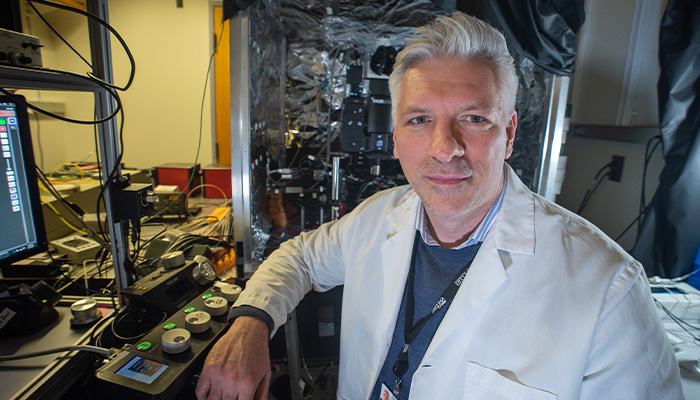HOW CAN WE HELP YOU? Call 1-800-TRY-CHOP
In This Section
Faculty Spotlight: Hippocampal Hyperexcitability With Srdjan Joksimovic, PharmD, PhD
Editor’s Note: Meet the diverse, dedicated, and distinctive faculty who are discovering and developing pediatric life-changing solutions at Children’s Hospital of Philadelphia Research Institute, in our monthly Faculty Spotlight series. This year, we’re celebrating our internal grant recipients who are pursuing new avenues of research with this dedicated funding support. Although we cannot feature all the award recipients in this series, we congratulate their continued hard work and scientific contributions to pediatric research.
In this Q&A, we meet Srdjan Joksimovic, PharmD, PhD, recipient of the Research Track Faculty Pilot Program. Stay tuned for more from our Faculty Spotlight series throughout the year. Dr. Joksimovic has worked at CHOP since 2021, coming from the University of Colorado with a focus on neuroscience research. His mentors include Douglas Coulter, PhD, and Stewart Anderson, MD.
Can you tell us a little about your research specialty?

Srdjan Joksimovic, PharmD, PhD
My main research specialty is hippocampal circuitry underlying behavior in normal and pathological conditions. Hippocampal formation, a brain area crucial for spatial navigation and the generation of episodic memories, is heavily implicated in different brain disorders such as schizophrenia or epilepsy.
More recently, my research has focused on the mechanisms that regulate excitability of the main output region of the hippocampal formation — the subiculum. This area, despite its significance, receives comparatively negligible attention. My experience in recording neuronal activity using electrophysiology or calcium imaging combined with behavioral pharmacology working with different animal models allows me to apply a multidisciplinary approach in investigating the role of this circuitry in memory processing.
Why did you choose to focus on that specialty?
The questions of how we create thoughts, memories, and fears, and how neuronal networks control these behaviors encouraged me to pursue a career as a neuroscientist rather than as a traditional pharmacist. During my scientific training, I learned that brain disorders associated with certain cognitive deficits share a common neuronal network dysfunction, in many instances, which intrigued me, so I wanted to have a deeper understanding of these processes. It seems likely to me that the absence of adequate drugs for psychiatric disorders, among others, directly correlates with our insufficient understanding of basic physiological mechanisms that govern the activity of neuronal networks, and in turn, complex behaviors.
What is a new avenue of research you’re able to explore, as a result of the Research Track Award?

Dr. Joksimovic studies the neuronal circuitry that underlies the mechanisms of complex brain disorders.
The Research Track Award allowed me to expand my current research by studying mechanisms underlying hyperexcitability-induced dysfunction of hippocampal-cortical circuitry in an animal model of 22q11.2 deletion syndrome (22qDS). Many patients with 22qDS have learning and memory deficits and experience at least one lifelong psychiatric disorder. Previous research showed that the dysfunctional hippocampal circuitry is associated with behavioral and cognitive changes in these patients. Our findings may lead to sophisticated circuit-based interventions, as traditional pharmacotherapy remains challenging in patients with 22qDS.
Can you tell us about a current or recent research project that you are excited about?
My move to the CHOP/Penn campus and the lab of Dr. Coulter, one of the most renowned scientists in the field of epilepsy research, gave me new opportunities to study hippocampal circuitry in temporal lobe epilepsy (TLE). The available treatment options for TLE focus primarily on ameliorating seizure events, but patients face cognitive impairment and behavioral disturbances that are detrimental to quality of life and often are not corrected by existing therapies. One of the new avenues I am currently exploring is whether manipulating this circuitry may alleviate cognitive and affective comorbidities in TLE.
What are the long-term research questions you hope to answer?
My long-term interest is to begin to unravel the question of how different neuronal firing patterns shape synchronous activity across multiple brain regions, thereby regulating memory formation and retrieval. I strongly believe that revealing the neuronal circuit contributors to memory processing disruptions could aid in generating novel therapies to improve cognitive deficits in different brain disorders. I hope that the specific insights and targeted therapeutic strategies developed in the coming years will have the potential to generalize more broadly to other circuits disrupted in TLE or 22qDS, to name a few, resulting in treatment opportunities for diverse contributory symptoms.


